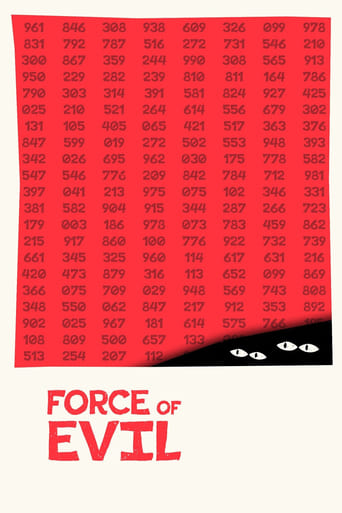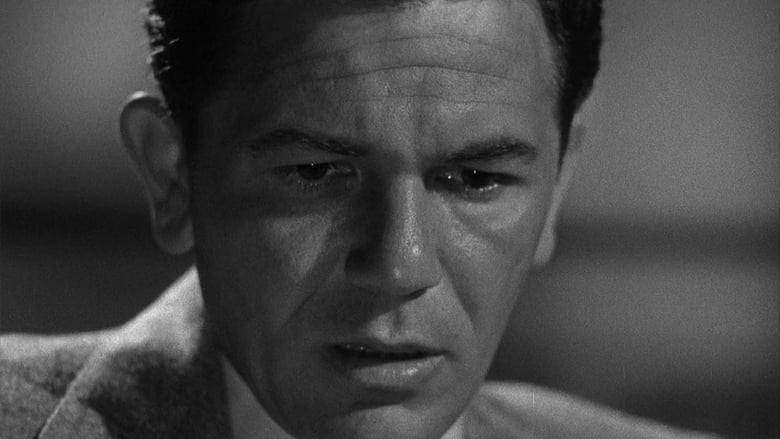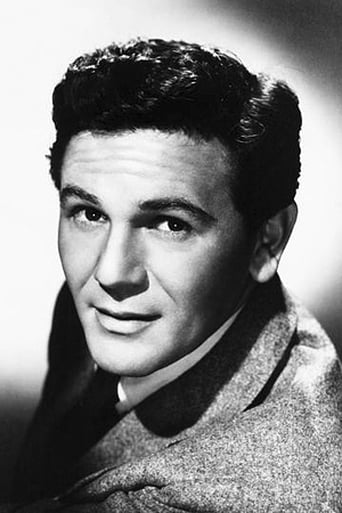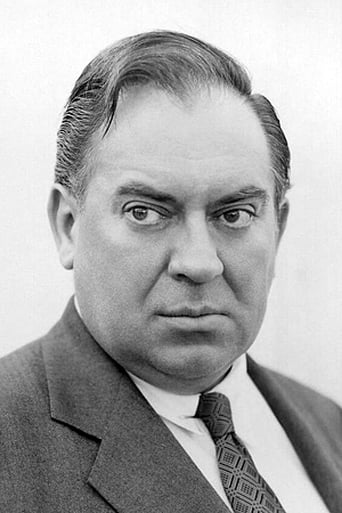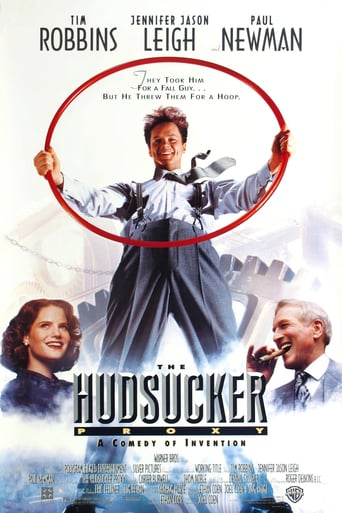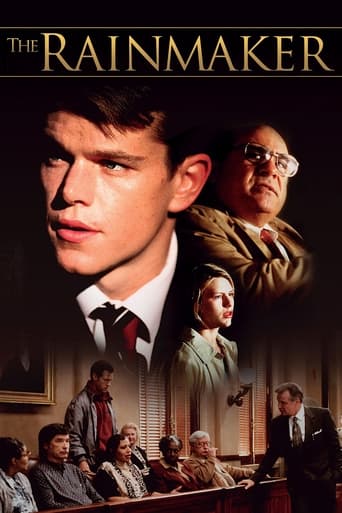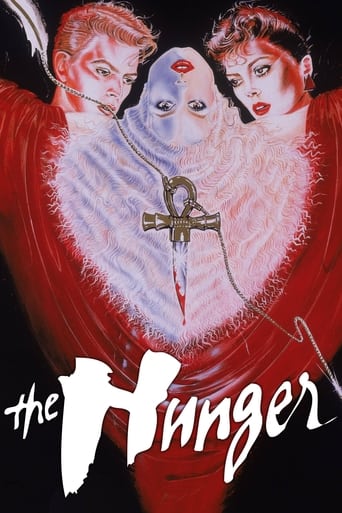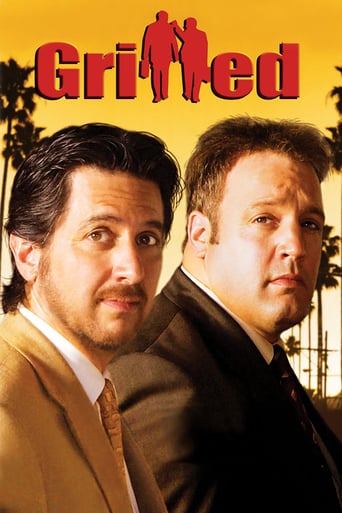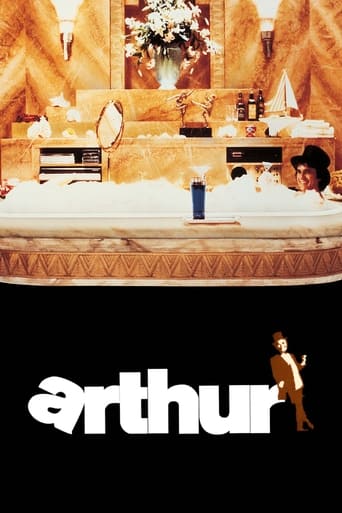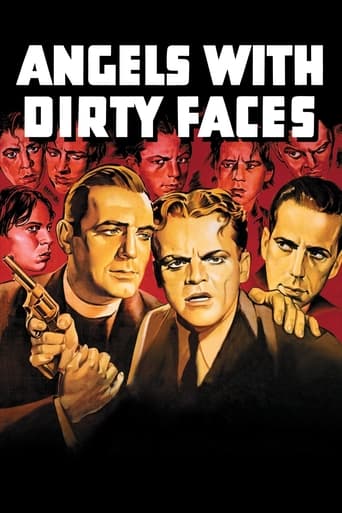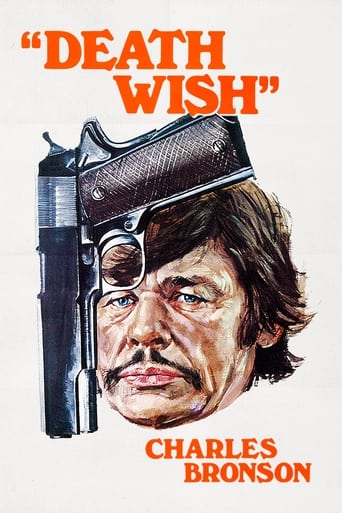Force of Evil (1948)
Lawyer Joe Morse wants to consolidate all the small-time numbers racket operators into one big powerful operation. But his elder brother Leo is one of these small-time operators who wants to stay that way, preferring not to deal with the gangsters who dominate the big-time.
Watch Trailer
Cast


Similar titles
Reviews
not as good as all the hype
Lack of good storyline.
I think this is a new genre that they're all sort of working their way through it and haven't got all the kinks worked out yet but it's a genre that works for me.
Story: It's very simple but honestly that is fine.
A richly provocative movie that could serve as a bible of film making, "Force of Evil" succeeds on a number of planes , establishing itself not only as classic noir, but as a reflection of its period. Visually, the compositions are exciting, from the elegant decor gilding the halls of power to the closeup of horror that punctuates Bower's brutal murder, the rich complexity seldom falters. There are echoes here of Eisenstein, and one can't help noticing the presence of Robert Aldrich as Assistant Director, an apprenticeship that would payoff in the visually similar "Kiss Me Deadly", suggesting that Aldrich served for a time as trustee of the blacklisted Polonsky estate. The script occasionally rises to the level of poetic Blank Verse, and is expertly intoned by John Garfield, Beatrice Pearson, and Thomas Gomez in a sweatily memorable performance.Thematically, Marxist Polonsky and co-scripter Ira Wolfert take a shot at the Darwinist world of capital, where big fish survive by eating smaller fish or by muscling in on the catch (Ficco's strategy), while working class minnows offer up dimes and quarters in hopes of instant metamorphosis. It's an ugly world where corruption and greed reach from top to bottom. Since the Production Code of the time couldn't leave matters in an unregenerate state, an upbeat ending is tacked on that defies the logic of what has gone before. Nevertheless, the sharply-etched images remain, vividly - memorably. And it's ironic that any intended remake will have to consider that the biggest fish of all has taken over the numbers racket and renamed it - the State Lottery. I wonder if Polonsky was amused.
A corrupt lawyer Joe is hired by a rich gangster. A scam is concocted to ensure that all of the small numbers banks in New York will be bankrupted, leaving the way open for the gangster's syndicate to move in and buy them over. Joe's elder brother Leo runs one of these numbers banks, so Joe feels compelled to warn him of the situation which in turn puts him in an extremely compromised position.Under the surface, Force of Evil was an allegory of the corrupting nature of capitalism. All of the characters go thorough moral dilemmas and change their positions due to the possibilities of monetary gain. The way that big business works in a very underhand and amoral way in this film was meant as a comment on how actual business practises in post-war America could often be somewhat nefarious. The movie itself was not successful at the time. It may have been because of these themes but it might simply have been that this was a pretty complex movie that doesn't have clear heroes or villains. This very ambiguity has made it more cherished as the years have gone by but most probably contributed to it not being box office dynamite at the time. Force of Evil has, therefore, gone on to become one of the cult movies of film-noir.The acting and script are very good. But so is the look. There is some great New York location photography, particularly in the final third. While good expressionist use is made of light and shade. So, in summary, this is a serious-minded film-noir with a well crafted aesthetic. It's certainly a less well-known example of the genre but it's definitely one with quite a bit more going on under the surface than most.
Joe (John Garfield) plays a corrupt lawyer who is in partnership with gangster Ben Tucker (Roy Roberts) to control the "numbers" game. Joe tries to help his brother Leo (Thomas Gomez) who operates an illegal small bank for betting who is going to be made bankrupt by a fixed scam that will make banks pay out more than they have. The idea is for the gangsters to then come in and take things over. Leo refuses to listen, but is forced to draw himself into the new conglomerate that Ben Tucker is organizing. A rival gangster turns up wanting a share of the spoils from this particular scam and as a result of a killing and a kidnap, and phones being tapped by the prosecutor's department, the whole set-up is brought before a court.This is a boy's film about gangsters and it can get pretty confusing if you don't pay attention throughout. The female roles are irrelevant to the plot which is a shame in the case of Marie Windsor who plays "Mrs Tucker". She is the best of the cast in her scenes and she completely outshines the rather feeble and bland Beatrice Pearson who plays "Doris". I also found the love interest between John Garfield and Peatrice Pearson difficult to believe. The acting is generally good with Thomas Gomez also deserving a mention. I didn't like him at the beginning but he managed to change my opinion so that I was sympathetic to him towards the end.In fact, the end section of the film is the most memorable with several good scenes including a set-up in a cafe, a confrontation between the main bad guys, clever use of the telephone bugging operation and a discovery on some rocks under a pier. Unfortunately, I lost interest in the film whenever Beatrice Pearson was on screen, which seemed like way too much, and the story can get confusing, so the film loses points on those accounts.It's a film that has a message similar to "On The Waterfront" in saying that the only way to topple powerful gang cartels is to stand up to them legally.
Is money good? Is greed good? Are they necessary? Are they evil? These and other questions aren't necessarily answered, as much as pondered in this tale of a lawyer hired by a numbers racket group and then being embroiled into their lifestyle and the inner schemes. In the beginning we see John Garfield as an amoral self-absorbed individual and his older brother, played by Thomas Gomez, as more of a moral, decent hard-working man, who still works in his own betting office, where people place their bets. Gomez brought Garfield up and sacrificed for him, and John appears to be ungrateful, now living like a king with no qualms about the money he earns and how he earns it. "Money's money, isn't it?" But, as this film noir progresses we are shown that things aren't all black and white, as a lottery ticket. We are allowed to see Garfield as human, with feelings and he is even given a love interest, who happens to find something to love about him. What seems like a dark example of a film noir really feels as a biblical-style tale of salvation for John Garfield's character, with the comparisons of brothers John and Thomas to Cain and Abel, and Jacob and Esau. Others may not see as deeply into it as I, but it is riveting and intense viewing, for all film noir buffs. The ending may perplex some, as it doesn't so much end as move to another chapter that's left to your imagination. But, as one of the more socially and culturally important film noirs ever made, Force of Evil is essential to all lovers of film. Entertaining, yes. But, maybe you can learn something, too.

